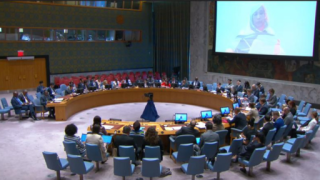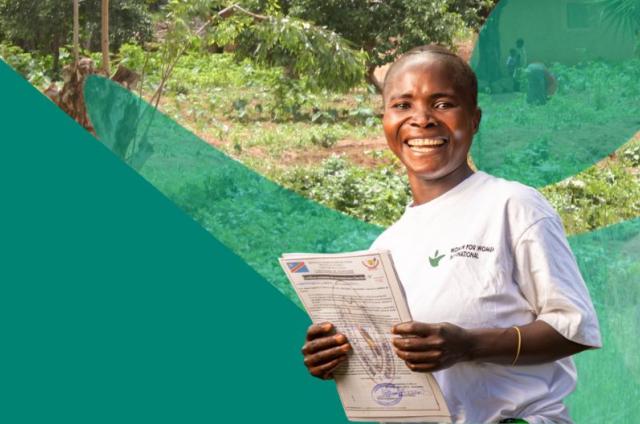UN Security Council Briefing on Sudan by Dr. Limiaa Ahmed
This statement was made by one of our Conflict Response Fund partners - Dr. Limiaa Ahmed, Senior Program Director, Sudan Family Planning Association - at the United Nations Security Council Meeting on Sudan on 18 June 2024.
President, Excellencies, civil society colleagues,
Thank you for the opportunity to brief you on the impact of the brutal war in Sudan on the rights of women and girls.
I am Dr. Limiaa Ahmed, Senior Program Director for the Sudan Family Planning Association (SFPA), a leading national NGO providing sexual and reproductive health services, with a special focus on marginalised and internally displaced women and young girls. In 2023, I fled Sudan—my home and my community—as a result of the war.
It has now been more than one year since the onset of the latest conflict in Sudan between the Sudanese Armed Forces (SAF) and the Rapid Support Forces (RSF), a war that has robbed so many of my people of their safety, their rights, and their livelihoods. Today, more than 16,650 people are dead,[1] nearly 10 million displaced,[2] and 18 million face acute food insecurity.[3] This conflict is also a war on women,[4] who are the primary targets of gender-based violence, the majority of those displaced, and adversely affected by hunger. Sudan is now one of the world’s largest displacement crises,[5] and is on the cusp of becoming the world’s largest hunger crisis,[6] with UN officials warning that famine is imminent.[7] As the needs have grown, so too have the challenges to humanitarian assistance and service delivery. In March and April this year, some 860,000 people did not receive humanitarian aid in the states of Kordofan, Khartoum, and Darfur, due to violent clashes as well as bureaucratic restrictions.[8]
Escalating violence by the RSF in El Fasher has already had a devastating impact on civilians—at least 200 people have been killed,[9] over 1,000 civilians injured,[10] and over 129,000 people displaced.[11] As the Security Council recognised with the adoption of Resolution 2736 last Thursday, there must be an immediate halt to the siege of El Fasher in order to prevent further mass atrocities and to protect civilians. In addition, an estimated 1.8 million people in El Fasher are at imminent risk of famine and in desperate need of humanitarian assistance.[12]
Without urgent international action to stop the war in Sudan, there will be catastrophic consequences for civilians.[13] As recently noted by the UN Special Adviser on the Prevention of Genocide, this includes the risk of genocide and other related crimes.[14]
I am here to ask for your help as the people of Sudan can wait no longer.
Since April 2023, UN experts[15] and civil society[16] have warned that gender-based violence and conflict-related sexual violence are widespread, and have risen at alarming rates,[17] leaving at least 6.7 million people at risk.[18] A number of survivors of sexual violence have died by suicide.[19] Sudanese women and girls face risk of sexual violence and exploitation in displacement, in transit, in temporary shelters, or at border crossings; insecurity and looting; increasing rates of forced marriage; and lack of access to sexual and reproductive health services in IDP host countries.[20] In RSF-controlled areas, women and girls have been abducted and held in inhumane and degrading slave-like conditions, where they are reported to be forcibly married or held for ransom.[21]
Through my work at SFPA, I have seen some of these facts and figures play out in reality. In the last 12 months, we have delivered over 33 million sexual and reproductive health services—including HIV/AIDS, STI services and gender-based violence services—through our 15 branches across Sudan. I have heard first hand the experiences of a group of displaced women and girls who fled war in El Gezira and were raped by the RSF. These women received sexual and reproductive services, including abortion care, under the supervision of SFPA staff and were then hosted in shelters run by national NGOs, as these survivors were abandoned by their families with no social, financial, or legal support.
Like all other Sudanese civil society organisations, SFPA staff have worked under very difficult and distressing circumstances to deliver services related to health, including sexual and reproductive health and rights, as well as socio-economic and psychosocial support, and capacity strengthening. Due to the ongoing conflict, we have lost one of our staff, our clinics have been burned, looted, and damaged, and we have had to relocate our headquarters to areas outside of RSF control. Despite these challenging circumstances, including insecurity, risk, and bureaucratic restrictions, we are determined to continue our mission to meet the increasing needs of women and girls in local communities.[22]
Women’s rights and women-led organisations have spared no effort to assist women and girls affected by gender-based violence. However, our organisations are severely underfunded and do not have the capacity to cope with the scale of violence against women and girls. It is essential that the international community support and fund local and national organisations like ours, without whom life-saving services for women and girls are not possible.
Excellencies,
The women of Sudan have been resolute in our calls for peace and an end to all violence against civilians, including all acts of sexual and gender-based violence. I am today appealing to the Security Council and the UN Secretary-General’s Personal Envoy for Sudan, Ramtane Lamamra, to escalate diplomatic efforts to urge parties to the conflict to end the war and prioritise a peaceful solution to the crisis.
The Security Council’s adoption of Resolution 2736, demanding an immediate cessation of hostilities, especially the fighting in El Fasher, was an important step. I now urge you to ensure its full implementation, including by continuing to urge all parties to comply with their obligations under international humanitarian and human rights law, protect civilians and civilian objects, and commit to an immediate ceasefire.
As also noted in Resolution 2736, it is critical that all parties ensure rapid, safe, unfettered, and sustained humanitarian access across Sudan for civilians in need, including by removing bureaucratic and other restrictions, in order to mitigate the worst impacts of food insecurity and famine and to ensure that all affected communities receive much-needed aid. I further call on donors to urgently scale-up funding for the Sudan Humanitarian Response Plan 2024, which as of May was only 16 percent[23] funded, and expand funding for local responders who are the backbone of the response to the current crisis, including women-led and women’s rights organisations.
Given the scale and urgency of the crisis, it is also critical that the UN and the Security Council identify credible options on the ground for assuring humanitarian operations across Sudan, and documenting violations of international law.
Finally, I echo this Council’s call to all parties to immediately cease all acts of sexual and gender-based violence and hold those responsible to account, and to take all possible steps to ensure the full, equal, meaningful, and safe participation of women in all peace talks and political processes concerning the conflict, as well as in the design and delivery of the humanitarian response.
Excellencies,
Sudanese women have paid the price of this war, with their lives, and with their bodies. As this Council has championed since 2000 with the adoption of Resolution 1325 and the establishment of the Women, Peace and Security agenda, there can be no peace in Sudan without women, whose voices must be at the heart of prevention, participation, protection, and recovery efforts.
Millions of Sudanese women and girls are looking to this Council to act now.
Thank you.


